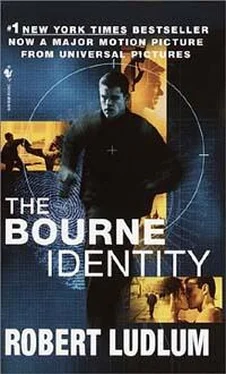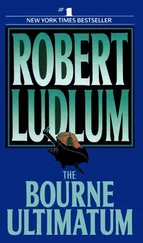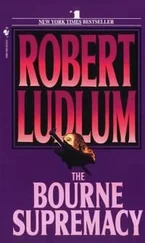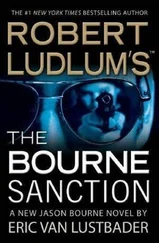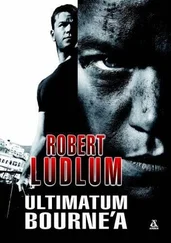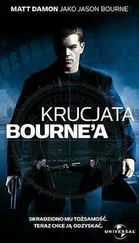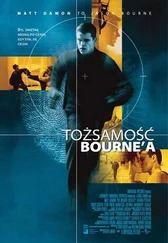Bourne had to say the words. “I trapped you by pretending one thing; you can trap me by pretending another. How do I know Parc Monceau isn’t a trap?” The old man did not waver. “You have the word of a general officer of France, and that’s all you have. If it’s not good enough for you, take your weapon and get out.”
“It’s good enough,” said Bourne. “Not because it’s a general’s word, but because it’s the word of a man whose son was killed in the rue du Bac.”
The drive back into Paris seemed far longer to Jason than the journey out. He was fighting images again, images that caused him to break out into sweat. And pain, starting at his temples, sweeping down through his chest, forming a knot in his stomach—sharp bolts pounding until he wanted to scream.
Death in the skies … from the skies. Not darkness, but blinding sunlight. No winds that batter my body into further darkness, but instead silence and the stench of Jungle and … riverbanks. Stillness followed by the screeching of birds and the screaming pitch of machines. Birds … machines … racing downward out of the sky in blinding sunlight. Explosions. Death. Of the young and the very young.
Stop it! Hold the wheel! Concentrate on the road but do not think! Thought is too painful and you don’t know why.
They entered the tree-lined street in Parc Monceau. Villiers was a hundred feet ahead, facing a problem that had not existed several hours ago: there were many more automobiles in the street now, parking at a premium.
There was, however, one sizable space on the left, across from the general’s house; it could accommodate both their cars. Villiers thrust his hand out the window, gesturing for Jason to pull in behind him.
And then it happened. Jason’s eyes were drawn by a light in doorway, his focus suddenly rigid on the figures in the spill; the recognition of one so startling and so out of place he found himself reaching for the gun in his belt.
Had he been led into a trap after all? Had the word of a general officer of France been worthless?
Villiers was maneuvering his sedan into place. Bourne spun around in the seat, looking in all directions; there was no one coming toward him, no one closing in. It was not a trap. It was something else, part of what was happening about which the old soldier knew nothing.
For across the street and up the steps of Villiers’ house stood a youngish woman—a striking woman—in the doorway. She was talking rapidly, with small anxious gestures, to a man standing on the top step, who kept nodding as if accepting instructions. That man was the gray-haired, distinguished-looking switchboard operator from Les Classiques. The man whose face Jason knew so well, yet did not know. The face that had triggered other images … images as violent and as painful as those which had ripped him apart during the past half hour in the Renault.
But there was a difference. This face brought back the darkness and torrential winds in the night sky, explosions coming one after another, sounds of a staccato gunfire echoing through the myriad tunnels of a jungle.
Bourne pulled his eyes away from the door and looked at Villiers through the windshield. The general had switched off his headlights and was about to get out of the car. Jason released the clutch and rolled forward until he made contact with the sedan’s bumper. Villiers whipped around in his seat.
Bourne extinguished his own headlights and turned on the small inside roof light. He raised his hand—palm downward—then raised it twice again, telling the old soldier to stay where he was.
Villiers nodded and Jason switched off the light.
He looked back over at the doorway. The man had taken a step down, stopped by a last command from the woman. Bourne could see her clearly now. She was in her middle to late thirties, with short dark hair, stylishly cut, framing a face that was bronzed by the sun. She was a tall woman, statuesque, actually, her figure tapered, the swell of her breasts accentuated by the sheer, close-fitting fabric of a long white dress that heightened the tan of her skin. If she was part of the house, Villiers had not mentioned her, which meant she was not. She was a visitor who knew when to come to the old man’s home; it would fit the strategy of relay-removed-from-relay. And that meant she had a contact in Villiers’ house. The old man had to know her, but how well? The answer obviously was not well enough.
The gray-haired switchboard operator gave a final nod, descended the steps and walked rapidly down the block. The door closed, the light of the carriage lamps shining on the deserted staircase and the glistening black door with the brass hardware.
Why did those steps and that door mean something to him? Images. Reality that was not real.
Bourne got out of the Renault, watching the windows, looking for the movement of a curtain; there was nothing. He walked quickly to Villiers’ car; the front window was rolled down, the general’s face turned up, his thick eyebrows arched in curiosity.
“What in heaven’s name are you doing?” he asked.
“Over there, at your house,” said Jason, crouching on the pavement. “You saw what I just saw.”
“I believe so. And?”
“Who was the woman? Do you know her?”
“I would hope to God I did! She’s my wife.”
“Your wife?” Bourne’s shock was on his face. “I thought you said … I thought you said she was an old woman. That you wanted her to listen to me because over the years you’d learned to respect her judgment. In the field, you said. That’s what you said.”
“Not exactly. I said she was an old soldier’s woman. And I do, indeed, respect her judgment. But she’s my second wife—my very much younger second wife—but every bit as devoted as my first, who died eight years ago.”
“Oh, my God …
“Don’t let the disparity of our ages concern you. She is proud and happy to be the second Madame Villiers. She’s been a great help to me in the Assembly.”
“I’m sorry,” whispered Bourne. “Christ, I’m sorry.”
“What about? You mistook her for someone else? People frequently do; she’s a stunning girl. I’m quite proud of her.” Villiers opened the door as Jason stood up on the pavement. “You wait here,” said the general, “I’ll go inside and check; if everything’s normal, I’ll open the door and signal you. If it isn’t I’ll come back to the car and we’ll drive away.”
Bourne remained motionless in front of Villiers, preventing the old man from stepping forward “General, I’ve got to ask you something. I’m not sure how, but I have to. I told you I found your number at a relay drop used by Carlos. I didn’t tell you where, only that it was confirmed by someone who admitted passing messages to and from contacts of Carlos.” Bourne took a breath, his eyes briefly on the door across the street. “Now I’ve got to ask you a question, and please think carefully before you answer. Does your wife buy clothes at a shop called Les Classiques?”
“In Saint-Honoré?”
“Yes.”
“I happen to know she does not.”
“Are you sure?”
“Very much so. Not only have I never seen a bill from there, but she’s told me how much she dislikes its designs. My wife is very knowledgeable in matters of fashion.”
“Oh, Jesus.”
“What?”
“General, I can’t go inside that house. No matter what you find, I can’t go in there.”
“Why not? What are you saying?”
“The man on the steps who was talking to your wife. He’s from the drop; it’s Les Classiques. He’s a contact to Carlos.”
The blood drained from André Villiers’ face. He turned and stared across the tree-lined street at his house, at the glistening black door and the brass fittings that reflected the light of the carriage lamps.
Читать дальше
